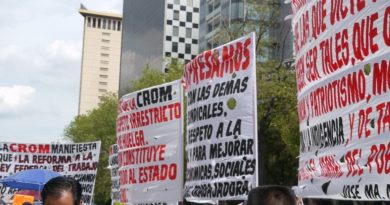Running for Office in Mexico: A Path to Change or a Death Sentence
Samira Ali
Staff Writer
In a country where the pursuit of public office has become synonymous with peril, the 2024 Mexican election season serves as a stark reminder of the escalating violence that has gripped the nation for decades. The nation’s largest-ever election cycle, with nearly 20,000 local and federal seats contested, has resulted in the deaths of over 36 candidates since last June. Many of these deaths are believed to be directly correlated to organized crime, leaving candidates in a perplexing position: how can they seek change when the very act of running for office poses a significant threat to the lives and security of themselves and their families? As Claudia Sheinbaum begins her term in office as Mexico’s first female president, the shadow of her predecessor’s inefficient attempt to address crime looms, raising questions as to whether her administration can effectively confront crime and restore security to the Mexican population and government.
While Mexico often experiences an uptick in organized crime and violence during election seasons, 2024 has surpassed previous statistics due to its record number of incidents. The ACLED (Armed Conflict Location & Event Data) found that there were over 330 incidents of violence against political figures, with 95 incidents resulting in at least one or more deaths. Hundreds of other candidates and their loved ones were also victims of vicious threats, most notable among female candidates. Such horrific metrics trumped those of the 2018 and 2021 federal elections, which totaled 254 and 257 events, respectively. This surge in violence is largely due to the fracturing of major organized crimes syndicates which has in turn led to fierce competition between rival gangs who are attempting to intimidate weak and underfunded local authorities and government officials, reports the New York Times. By targeting this subset of government, the gangs can gain control over communities, territory, and resources, allowing them to expand their operations. This behavior has largely resulted in the creation of a surveilled society, in which both candidates and citizens are reminded they are always being watched by powerful gangs, creating a discouraging climate for those seeking to participate in democratic processes and government.
Given the alarming increase in violence throughout the presidency of outgoing Andres Manuel Lopez Obrador (2018-2024), marked by nearly 30,000 annual homicides and 50,000 missing persons, candidates have required stringent security measures for their protection. Lopez Obrador’s “hug not bullets” strategy has failed to reduce these staggering statistics. In fact, the looming threat posed by organized crime has made it nearly impossible for politicians to openly announce their intentions to tackle security issues and gang violence, fearful for their lives, explains Al Jazeera. Additionally, candidates must consider whether their security personnel, provided by the federal government, may be perceived as a declaration of war in their municipalities. Their voters are aware of this reality, and a significant percentage of the electorate prioritizes effective action against crime when casting their ballots above other critical issues such as unemployment and inflation. This is particularly seen in border regions which is vulnerable to cartel-related violence from smuggling and trafficking.
When Claudia Sheinbaum took office on October 1, she inherited a complex and violent political landscape, with hopes to bring tangible change. While Sheinbaum has been praised for her efforts as the mayor of Mexico City to reduce the city’s homicide rate by half, through increased security and police spending, she is challenged to do the same on a national level, states Reuters. Despite her accomplishments, many voters remain unconvinced that she has the power to effectively tackle the violence that plagues their nation, especially given Sheinbaum’s affiliation with the same party as her predecessor. She will need to confront record-breaking violence and instability which has led numerous states to disengage in the democratic process to protect their citizens, and she must address the plight of thousands of impoverished Mexicans who flee to the United States due to gang violence, a challenge her predecessors have been unable to overcome.
Image courtesy of Getty Images

